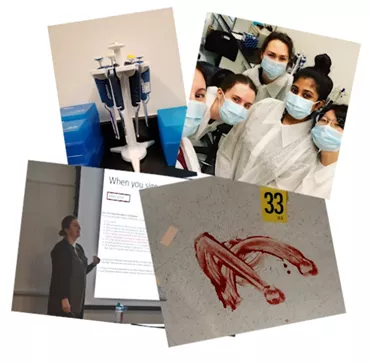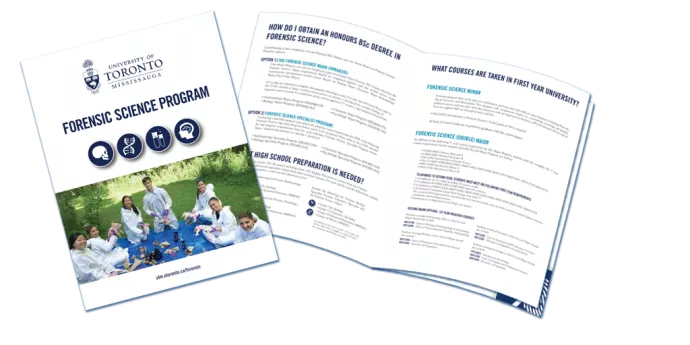

Forensic Biology explores the collection and examination of human tissue and fluids, like blood and saliva. At UTM, we focus on DNA mapping and genomic analysis, not just for individuals present at a crime scene, but also identification for mass disasters and general populations.
Forensic Biologists students have a variety of avenues after graduation, including:
-
Independent consulting labs
-
Government Technician positions
-
Forensic Pathology
-
Bacteriologist
-
Medico-legal Investigator
Dr. Nicole Novroski Dr. Nicole Novroski runs the Novroski Forensic Genetics Research Laboratory as well as 4NGEN DNA consulting services (www.nicolenovroski.com), where many students execute collaborative research in the areas of serology, DNA analysis and exploration of new forensic genetic areas such as forensic DNA phenotyping (FDP), ancestry exploration and the use of public DNA databases for forensic human identification.
FSC BIO DEGREE HIGHLIGHT: The Novroski Forensic Genetics Lab
The Novroski Research Laboratory is always looking for passionate and dedicated people to join their team. Research training opportunities are available for qualified students with an interest in forensic, investigative and/or molecular genetics. Prospective students can also explore the requirements for Master of Science and Doctor of Philosophy at the University of Toronto Anthropology Department here!
WHAT HIGH SCHOOL PREP IS NEEDED FOR THE FORENSIC BIOLOGY SPECIALIST DEGREE?
Students need six Grade 12U/M courses including:
-
Grade 12U Biology
-
Grade 12U Chemistry (SCH4U)
-
Grade 12U Advanced Functions (MHF4U)
In addition to the above, Grade 12 Calculus and Vectors (MCV4U) and Physics (SPH4U) are highly recommended for student success. These courses refer to the Ontario high school curriculum. We will accept equivalent courses from other academic systems. For more details, visit the Admissions website:
http://www.adm.utoronto.ca/adm-awards/admissions.action
WHAT DOES FIRST YEAR IN FORENSIC BIOLOGY LOOK LIKE?
In your first year, you will take the following courses:
-
BIO152H5: Introduction to Evolution and Evolutionary Genetics
-
BIO153H5: Diversity of Organisms
-
CHM110H5: Chemical Principles I
-
CHM120H5: Chemical Principles II
-
FSC239Y5: Introduction to Forensic Science
-
MAT132H5: Mathematics I
-
MAT134H5: Mathematics II
-
PHY136H5: Introductory Physics I
-
PHY137H5: Introductory Physics II
HOW DO I ADVANCE TO SECOND YEAR?
To advance to second year, students must meet the following first year requirements:
-
Completion of 4.0 credits; including 3.0 science credits.
-
Completion of BIO152H5, BIO153H5 each with a grade of 65% or higher.
-
Completion of CHM110H5, CHM120H5 each with a grade of 65% or higher.
-
Completion of FSC239Y5 with a grade of 70% or higher.
-
Completion of MAT132H5, MAT134H5.
-
A minimum Cumulative Grade Point Average of at least 3.0. The actual minimum CGPA requirement varies from year to year but is never lower than 3.0
At least 15.5 total credits (out of an average of 20) are required to graduate from this program.
Download the full Forensic Science Program Flyer below:

